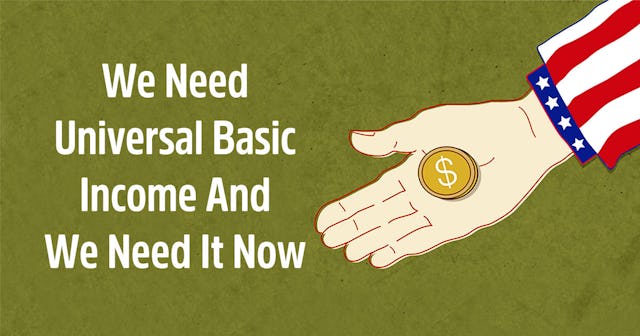We Need Universal Basic Income And We Need It Now

We’ve been having this conversation for years, the discussion about why we need universal basic income (UBI) in the United States. While many of us are still waiting to receive stimulus checks and millions of people remain out of work and filing for unemployment, we need universal basic income now.
Other countries have done this–provided a monthly income check for all their citizens. Germany is piloting it this week amid the pandemic (because, duh, a pandemic is exactly the time that families are stretched thin and need this extra boost). We can look at other countries as a guide–not only for universal basic income but to understand how they are handling the pandemic—and adopt some of the ways they are investing in their people.
Can you imagine if our country and its leaders would come together and guarantee that all of us have a basic life safety net no matter what shitstorm is thrown at us?
The idea behind universal basic income (or UBI) is that the government provides a specific amount of money every month to its citizens, keeping people out of poverty, in hopes that they will also remain employed and contributing members of society.
In Germany, over 120 people will receive $1,420 a month for the next three years, which is just above Germany’s poverty level — and the government will be studying how this affects their citizens. The study will then compare the 1,380 people who did not receive a monthly payment. In Germany’s case, 140,000 private donations have funded the study conducted by the German Institute for Economic Research which will study the work, lives, and emotional well-being of participants to determine if basic income has had a significant impact on their lives.
But we don’t need to go all the way to Germany to understand that universal basic income can work: just look at Alaska. Through their Alaska Permanent Fund Dividend, the government provides $1,000 or more a month to their citizens and has been since the inception of the fund in 1982, keeping them above the poverty level.
Sharon McCutcheon/Unsplash
Alaska seems to be doing things right. “For example, 40 percent of respondents say the yearly dividends have made a great deal or quite a bit of difference in their lives over the past five years, while only 20 percent say it has made no difference,” explains Salon. “Interestingly, Alaskans were also asked about how the dividend affects work incentives and willingness to work: 55 percent report no effect, 21 percent a positive effect, and 16 percent a negative effect. Thus, the majority of Alaskans report that the dividend has little to no effect on work.”
If we take a step back and look at our government, the CARES Act was a temporary (rather unsuccessful and broken) fix to a much greater problem — Americans are drowning and the economic wave we are all riding out together — is drowning us.
The need for a universal basic income plan is more than a “bandaid solution,” like a stimulus relief act is. UBI would give Americans something to depend on month after month — income they know is coming to feed their kids, put gas in their cars to go to work, and provide other necessities. The CARES Act is an attempt to support the economy by giving Americans money they will use to spend on things: vacations, home improvements, clothes, toys, and more — while the UBI will give stability to families in need.
As of July, the United States Department of Labor reported that 1.8 million Americans filed for unemployment, which means that 10.2% of Americans are struggling to keep a roof over their heads, food on the table, and maintain some sort of livelihood.
We cannot wait for another pandemic or the bubonic plague to land here with no plan in place for feeding families, keeping people in their jobs, and their homes. We need universal basic income sooner rather than later. We need a president who gets it and wants to make economic equality a thing. We need a president in the White House who does not just care about how many tweets can be pushed out (from the toilet) into the social media stratosphere each day.
We need a president and government who see poverty as a problem, who recognize that being out of work means not being able to provide for one’s basic needs — and that solutions are out there, if only we would take initiative, and do the right thing.
This article was originally published on